Opposition politician and activist Vladimir Kara-Murza makes the sign of the cross on the spot where Boris Nemtsov was shot and killed in Moscow© Michał Siergiejevicz
It was the aim of the Mikado in the Gilbert and Sullivan operetta of that name to try to make the punishment of wrongdoing fit the crime itself in some way, so that the perpetrator is laughed at in a gentle way, not beaten to a pulp. “My object all sublime I shall achieve in time,” the Japanese law-giver sings, “To make the punishment fit the crime, the punishment fit the crime.” The fictional Japanese judge wants the law-breaker to be made fun of as his punishment: “To make each prisoner (re)‘pent, unwillingly represent, a source of innocent merriment, of innocent merriment.” It requires subtilty, a quick brain and a desire for peaceful rule in a peaceful country, none of which attributes are within the grasp of Vladimir Putin, President of Russia. No-one could ever accuse him of being a devotee of justice and even-handedness, and certainly not very judicious, either.
The sentences being handed down to those who question his judgement are truly excessive and out of proportion to whatever the accused is alleged to have done. They would be more appropriate for serious acts of criminality, such as murder or, perhaps, a armed robbery. If you compare Russia with France, say, disagreement with the President takes the form of street demonstrations, with fires being lit and banners being waved. The demonstrators may annoy those in government but they haven’t been shot, nor locked up for years; that’s not the European way. Putin’s punishments certainly don’t fit the crime; on the face of it, they are out of proportion to the supposed wrong-doing under discussion. Now Vladimir Kara-Murza, a Russian-British former journalist, has been handed down a sentence of 25 years in prison simply for disagreeing with Putin and questioning the wisdom and indeed justification of his blood-thirsty invasion of Ukraine.
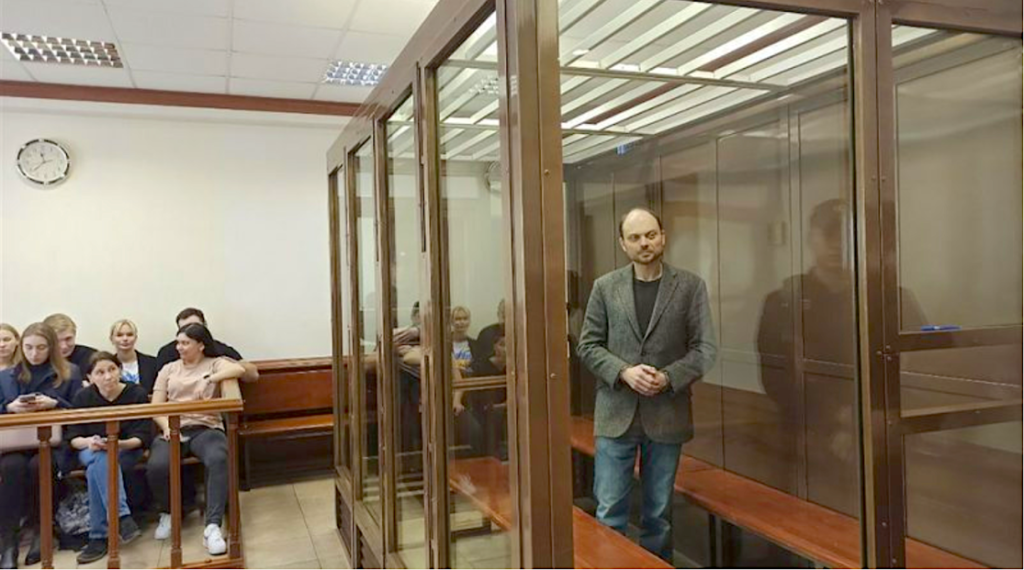
Under any other government in history such a ludicrous outcome would have been seen as a sign of weakness, rather like the violence of a brainless playground bully, proving his ineptitude by acts of violence, but Putin seems to believe that the length of the sentence is emblematic of his – Putin’s – strength. Surely, that is at the very least a misjudgement? It was Britain’s former Conservative Prime Minister Margaret Thatcher who said: “Being democratic is not enough, a majority cannot turn what is wrong into right. In order to be considered truly free, countries must also have a deep love of liberty and an abiding respect for the rule of law.” You won’t find that in Putin’s Russia.
Russia has always been, it seems, a place of sadness and deep, deep depression. The British humorous writer P.G. Wodehouse wrote: ““Freddie experienced the sort of abysmal soul-sadness which afflicts one of Tolstoy’s Russian peasants when, after putting in a heavy day’s work strangling his father, beating his wife, and dropping the baby into the city’s reservoir, he turns to the cupboards, only to find the vodka bottle empty.” Russia really needs to throw off this stubborn image of misery and desperation, but it will never be able to do that while Vladimir Putin remains in charge. Russian writers down the years have generally summed up life in Russia quite well. As Leo Tolstoy put it in War and Peace, “All we can know is that we know nothing. And that’s the height of human wisdom.” I have never met Putin and I have no great desire to do so, but I liked Gorbachev a great deal when we met. And I also liked his interpreter. The two of them were visiting the European Parliament in Brussels and standing with me just outside the press bar. They were perfect gentlemen. It was Thomas Jefferson, President of the United States from 1801 to 1809, who wrote that the government you get is the government you deserve, but that can’t be true surely? That would be just too cruel for the poor Russians. Nobody, surely, can deserve Vladimir Putin. Kara-Murza speaking on CNN, described the Kremlin as a “regime of murderers”. It sounds reasonable, too. Putin set aside any sort of respect for justice, apparently deciding to use the courts and Russia’s legal system as weapons with which to silence anyone who disagrees with him.
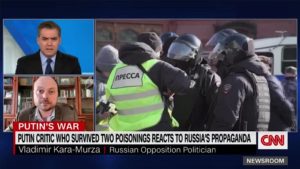
Kara-Murza was a close friend of the former opposition leader Boris Nemtsov, murdered in 2015 and he has himself, it’s alleged, been poisoned more than once. He nearly died from kidney failure on the first occasion, blaming the attempt to murder him on the Kremlin.
Concerns have been growing over Kara-Murza’s health after he was declared too unwell to attend his hearing. According to Britain’s Guardian newspaper, more than 450 people have had criminal cases opened against them simply for opposing the country’s invasion of Ukraine. Some are said to be facing sentences of up to 15 years for offences as seemingly insignificant as posting anti-war messages on social media. What it means is that the past year has been the most repressive in recent Russian history. Putin appears to be living according to the rules that applied in previous centuries: outright brutality and an attempt to silence those who oppose him through outright murder and severe repression. Life was rather like that under Germany’s Third Reich: agree with us or die.
| HITLER RIDES AGAIN (BUT SPEAKING RUSSIAN THIS TIME)
There is no doubt that Stalin’s change of position on Naziism and Hitler brought the Second World War to a much earlier end. Now, it seems, Putin is emulating Hitler and using violence and terror in his attempt to impose his undemocratic and dishonest rule on Europe and the wider world. Putin seems to believe he is above criticism and entitled to take whatever action he feels like, however cruel, in pursuit of his goals. He still believes that Russia needs the Vozhd, a leader and boss who is beyond criticism or reproach. It used to be Vladimir Ilyich Lenin, inventor of the Soviet system and creator of the Soviet Union, about whom school children were obliged to read what were, in effect, hagiographies. There could be no criticism, of course, and the children were taught to refer to him as Dyedushka, which means “Grandfather”.
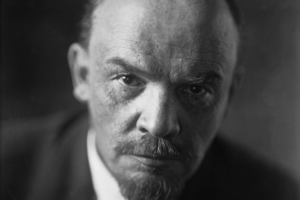
One old comrade who had rather gone off him said of him that he “desired good but created evil”. Putin has had his mausoleum, which still attracts long lines of sightseers and admirers, renovated and restored. Putin needs Lenin, it would seem, but is not personally a shadow of the man himself in character terms. Furthermore, it’s not at all certain that Putin ever “desired good” although he has undoubtedly created evil. What he seems to have desired is power, nothing more, nothing less. The price doesn’t seem to matter.
As for Kara-Murza, he is 41 years old and a father of three who holds both Russian and British passports, but he was charged not only with treason for opposing Russia’s invasion of Ukraine but also of discrediting the Russian military by spreading “false information” about its behaviour in what the court slavishly referred to as Russia’s “special military operation” (the world knows it’s a war but Putin prefers to soft-pedal on its description). Whatever Putin’s supporters choose to call it, an invasion is an invasion and it has been denounced as “a blatant violation of international law and the UN Charter”. The British Foreign Secretary, James Cleverly, has condemned the ludicrous prison sentence that the Russian court has imposed on Kara-Murza and has also denounced “Russia’s lack of commitment to protecting fundamental human rights, including freedom of expression”. There is concern among Kara-Murza’s friends and family over Russia’s very poor record in maintaining the health of prisoners His long-term chances during his unjust incarceration are not great but Kara-Murza remains defiant, despite the murders of others who have stood up to the dictator in the Kremlin. Let’s take a quick look at Russia’s record.
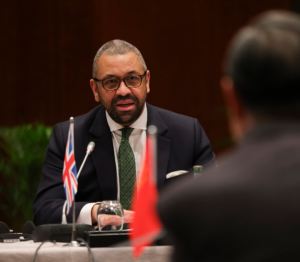
Anna Politkovskaya was a reporter who was shot dead in her apartment building in 2006. Then there was Sergei Magnitsky, a lawyer who was murdered in police custody in 2009. Boris Nemtsov, a prominent opposition politician was shot outside the Kremlin in 2015, while outside Russia’s borders, Alexander Litvinenko, a former KGB agent, was poisoned with the rare and highly radioactive metal polonium in 2006 in London. Slightly luckier were Sergei Skripal and his daughter Yulia who narrowly survived an assassination attempt, carried out by means of a nerve agent, in Salisbury in 2018.
Now, the imprisoned opposition figure Alexei Navalny is said to be in failing health following a suspected poisoning. Putin’s clumsiness in the removal of those who don’t support him would almost seem funny, like an incident in some kind of situation comedy, were it not for the deaths his brutality is causing. Putin is a dictator who probably feels that he doesn’t need to hide his culpability for murder because he wants people to be frightened of him.
| STORIES OF CRUELTY
This is a tragedy, because Russia has played a huge role in the evolution of literature, with giants like Tolstoy, Chekhov and Dostoyevsky whose works are still read and admired today. All the people of the future will remember about Russia is its mindless brutality and the way in which it ignores civilised standards that apply elsewhere in the world. Russia deserves a better legacy. Unfortunately, Putin seems to attach no importance to issues of legacy and reputation. It’s not that Russia isn’t concerned with its reputation and its place in history; a new military museum has just opened in Moscow but it has already been accused of blurring history and propaganda. Open Democracy, who sent a representative to see the museum, says that it seems deliberately to mix the illegal invasion it’s staging in Ukraine with the brave resistance to Hitler’s Nazis. They are not at all the same thing, of course, but Putin and his followers would like you to think so.
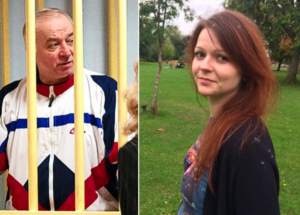
Honesty and Putin have long been estranged, it seems. The museum, according to Open Democracy, is basically a propaganda tool to legitimise the brutal invasion of Ukraine, with all its death and suffering. “History plays a key role in the official Russian discourse surrounding the invasion of Ukraine,” says Open Democracy, “In particular, the Second World War – or the Great Patriotic War, as it’s known from the Soviet perspective – and its supposed parallels with Russia’s current war has become a major trope in the state’s efforts to legitimise Putin’s foreign policy and compel the population to endure the hardships it entails.” How much Putin shares those hardships that his own brutal policies are inflicting on the Russian people is open to discussion, of course. Probably very little, although Putin would face arrest if he tried to take a holiday in the South of France. I don’t suppose he’ll oblige us like that, however.
You may not be surprised to discover that human suffering is a recurrent theme in Russian literature. Boris Pasternak, who wrote Doctor Zhivago was also famous for translating other writers’ work into Russian. His translations of such great literary figures as Goethe, Schiller, Calderón de la Barca and Shakespeare remain popular. In 1958 he was awarded the Nobel Prize in Literature but it so annoyed the Communist Party that he was obliged to reject it. It was only in 1989 that his son, Yevgeny, was able to accept the award on his behalf, although he had died in 1960. Set in the period between 1905 and the Second World War, it was never possible to publish Doctor Zhivago in the old Soviet Union, even though it now forms part of the canon of works in Russian for students of literature and it is still popular with the public. Despite everything, I would imagine that Omar Sharif, Julie Christie, Geraldine Chaplin and Rod Steiger, who starred in the film version, are probably safe from Putin’s anger.
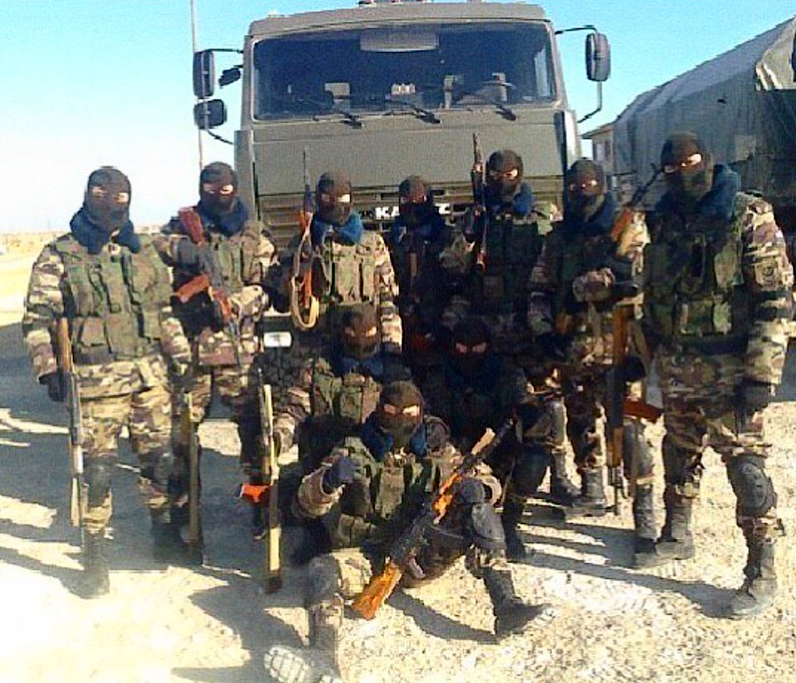
Whatever Putin does next we can at least be certain that it will be brutal and inhuman. A former Wagner Group mercenary has admitted participating in the summary executions of Ukrainian prisoners of war. He told Britain’s Guardian newspaper that his group had been told not to take prisoners. He told the newspaper he had “no regrets” and would like to go back and do it again. Another Wagner fighter admitted having killed civilians, including children – in one case a little girl of 5 or 6 years old who was screaming – because he’d been told “not to let anyone out”. The Wagner fighters in this case were convicted murderers who’d been offered freedom in return for their “service” to the Russian state. It makes us wonder just what sort of a state Putin wants Russia to be. Is he trying to build for himself a record of mindless thuggery to rival Stalin? At least Stalin brought education and a few good things, albeit heavily outweighed by his savage cruelty. Putin, it seems, wants to be remembered purely for his vicious style of rule and lack of compassion. These reports rather confirm that the Wagner group is not made up of real soldiers, merely thugs who murder people for money. There is increasing evidence of the war crimes for which Wagner is responsible, but the blame must rest solely with Putin. Ukrainian President Zelensky has promised to punish those who have committed such atrocities, but he’ll have to catch them first. One thing seems clear: Putin certainly won’t punish them. After all, they’re simply doing what he wants: helping to instil a sense of fear in the country he’s supposed to be running to ensure that there is no organised opposition.
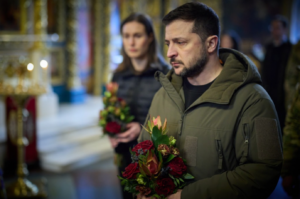
Russia is a very troubled country and having Putin in charge can only make things worse. The Russian people know that, too, fleeing their country in droves when Putin mentioned a partial mobilisation last September. Some even engaged in serious self-harm to avoid being forced to fight. Those suffering from HIV are automatically exempt from recruitment, which led to a massive upsurge in the sale of fake documents to provide exemption. According to the Joint United Nations Programme on HIV/AIDS, Russia comes fifth in the international league table of AIDS cases. The Russian health ministry has dismissed the figures as “provocative propaganda” but when one sufferer received a phone call to tell him he’s been recruited and he responded that he had AIDS, the recruiter responded by saying: “What difference does it make where you croak”. Given the mind-numbing insensitivity of the Russian state, it comes as a surprise to hear Putin saying that Russia cannot have a problem with HIV/AIDS because Russia has no drugs and no prostitution. And presumably a president who stays deeply asleep in the face of public concern. Russia has become a nightmare state, in denial at the official level about its many problems and apparently opposed to any form of sex education on the grounds that it would lead to promiscuity and an increase in HIV/AIDS cases.
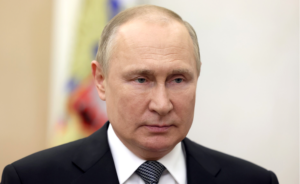
Don’t expect any breakthroughs in a state without a heart. Putin has said that the West’s support for gay and transgender rights is no better than “satanism”. One is tempted to say that where Satan is concerned, Putin should know. In any case, any mention of homosexuality is illegal there. What Putin has failed to explain (and it’s hard to see how he can blame western “immorality”) is why up to a hundred new HIV/AIDS infections are recorded among women in Russia every day. Putin thinks the answer to such issues is strict morality, which condemns sex acts outside marriage but is happy to see its soldiers, already condemned murderers in many cases, slaughtering children. It’s a very strange kind of morality that doesn’t really stand up to close scrutiny.
But let’s get back to the case of Kara-Murza. While the slaughter of children is apparently laudable, saying anything negative about Putin is not. Some of the Wagner fighters who’ve been apprehended displayed swastika tattoos, so their commitment to fair play and peace would seem to be in some doubt. It’s been reported in The New European newspaper that hospitals in the Russian-occupied parts of Ukraine are so overcrowded that some doctors are refusing to treat patients and those known to be infected with HIV/AIDS are mixing freely with others who are not infected (at least to start with). Putin’s idea on justice would shock people living in medieval times while his standard of morality clearly is not aligned with those that apply in the rest of the world. That’s why, of course, he can condone ludicrous jail terms for anyone who disagrees with him. The rest of the world must keep an eye on Kara-Murza, because Russia’s reputation for looking after its prison inmates is far from good. Putin, it seems, is a totally heartless brute who bangs on about morality whilst having none of his own. Once anyone falls into Putin’s power, his chances of a long and healthy life (even one spent behind bars) dwindle to zero.

